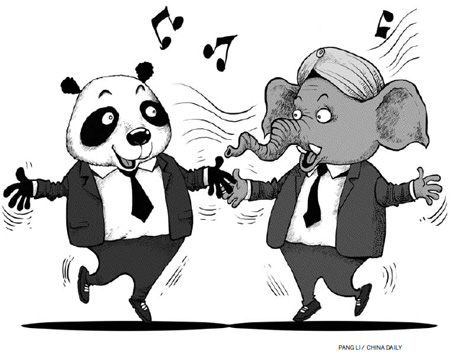Op-Ed Contributors
Right Sino-Indian move in right direction
Updated: 2011-06-21 07:56
By Avinash Godbole (China Daily)

India and China have resumed their military dialogue with the visit of a high-level Indian defense delegation to Beijing. This is a confidence-building step, and may be followed by the fourth bilateral defense dialogue later this year.
Although the resumption of military exchanges has gained little coverage in the Chinese media, it has drawn much attention in India and other countries.
Many anxious observers are following the development closely, because the fourth defense dialogue will take place at an extremely critical juncture. Despite the three defense dialogues held earlier, and notwithstanding the multiple meetings between the leaders of the two countries, the 2011 defense dialogue will be held under the shadow of recent history.
Therefore, the 2011 defense dialogue would be considered a success even if the two sides agree to avoid recurrence of the kind of incidents that drove bilateral relations to their lowest level in the past decade. It will ensure that future dialogues on any issue do not have to start on a clean slate, too. Subsequently, the barest minimum that Sino-India relations will achieve after the dialogue is momentum, the key missing ingredient that can take the bilateral ties decisively forward.
Lofty ideals apart, the critical question here is how does one achieve all this? Here are some suggestions from an Indian perspective on what has been missing and needs to be done in the short and long terms.
First, the two sides have to allay threat perceptions. This is the core task of the dialogue. Increasing economic engagement has not been able to boost confidence at the bilateral level as far as India and China are concerned. India views China's engagement with Pakistan negatively. It is generally felt in India that unconditional Chinese support to Pakistan at this juncture would encourage the belligerence of its leadership.
India needs to reassure China of its strategic independence. In other words, China needs to be told that India is not and will never become a client state unlike its western neighbor. India also has to make China believe that it will not help increase Beijing's strategic uncertainties in addition to its Asia-Pacific dilemma.
Chinese scholars have been liberally citing the Indo-US nuclear deal in the context of the Sino-Pakistani strategic nuclear cooperation. But this kind of argument undermines India's strategic independence, which is evident in its recent rejection of American bidders for its combat aircraft deal. If India were a client state of the US, it would not have taken the decision to reject America's offer so easily.
Besides, when China is going all out to ensure its energy security as a developing country, it should be willing to give India the same space for energy development, because New Delhi's energy needs are equally pressing. In other words, India is not a party to any "encirclement" strategy against China, and Beijing should do its bit to assure New Delhi that the "string of pearls" strategy, a source of great worry for Indians, is not true.
E-paper

Pret-a-design
China is taking bigger strides to become a force in fashion.
Lasting Spirit
Running with the Beijingers
A twist in the tale
Specials

Mom’s the word
Italian expat struggles with learning English and experiences the joys of motherhood again.

Lenovo's challenge
Computer maker takes on iconic brand apple with range of stylish, popular products

Big win
After winning her first major title, Chinese tennis star could be marketing ace for foreign brands
